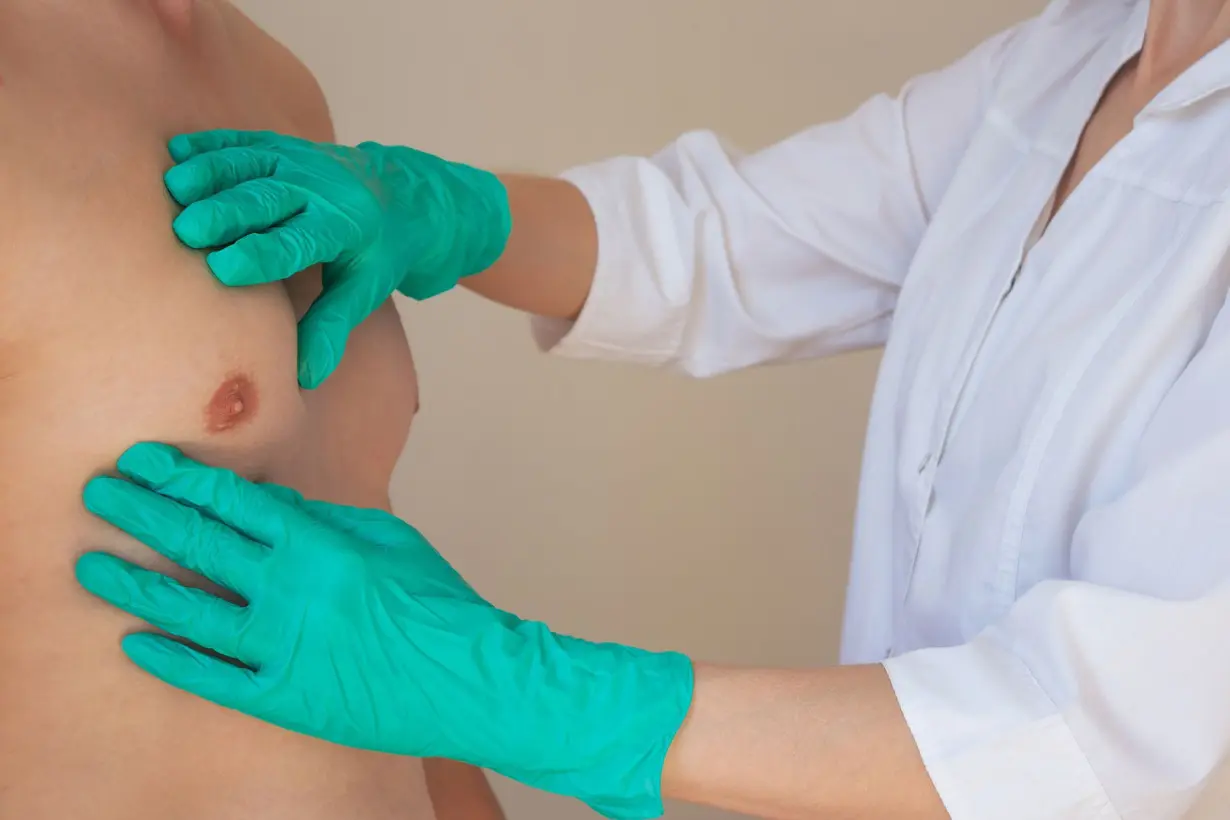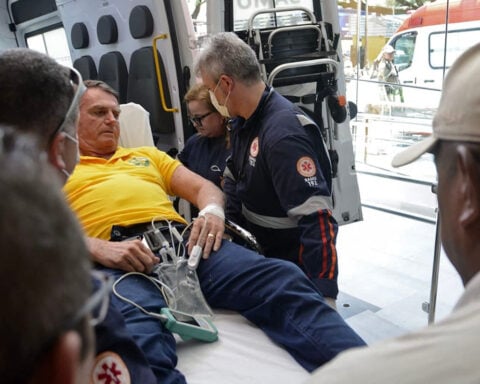(CNN) — A few years ago, I had a male patient who came to me complaining of breast enlargement.
At first, we thought it was a side effect of one of his medications for an enlarged prostate. But during the exam, something about one side just didn’t feel right to me.
I decided to order a mammogram to take a closer look. The results showed an abnormal spot, which led him to see a specialist.
The diagnosis for this man? Breast cancer.
Breast cancer in men can be misdiagnosed or overlooked because it’s so rare. Early detection can be lifesaving.
Why men don’t think about breast cancer
When people think of breast cancer, most think of “pink” and breast cancer in women. But the truth is men develop breast cancer, too. Men make up about 1% of all breast cancer cases, which means 1 in 726 men will be diagnosed in their lifetimes. The diagnosis is rare in men, but that is still a lot of men getting breast cancer.
One of the biggest challenges with male breast cancer is that it often flies under the radar. Many men don’t realize they can develop breast cancer, and there are no routine screening guidelines like there are for women.
In fact, more than 40% of male breast cancer cases are diagnosed at later stages (Stage 3 or 4). As a result, men get more aggressive treatments compared with women due to a delay in diagnosis.
The symptoms can be subtle — lumps, nipple discharge, changes in the skin or swelling around the breast area. If you notice any changes in those man boobs, don’t ignore them. It’s always better to get checked.
The role of genetics in male breast cancer
Mutations in the BRCA1 and BRCA2 genes, which are more commonly associated with female breast and ovarian cancer, can increase a man’s risk for breast cancer. About 0.2% to 1.2% of men with an inherited mutated change in BRCA1 and 1.8% to 7.1% with an inherited mutated change in BRCA2 will develop breast cancer by age 70.
In contrast, about 0.1% of men in the general population will develop breast cancer by the same age. Men with BRCA2 mutations have a 7% to 8% lifetime risk of developing breast cancer, much higher than the general male population. Therefore, men with a family history of breast cancer, especially those with BRCA mutations, should consider genetic testing and be more sensitive to any changes in their breast tissue.
The link between BRCA and prostate cancer
These same BRCA mutations also increase the risk of prostate cancer in men.
A young patient recently came to my office with a concern that many wouldn’t expect for his age — prostate cancer. His mother and sister had been diagnosed with breast cancer, and despite being in his mid-40s, he requested both genetic testing for the BRCA gene and a prostate-specific antigen, or PSA, blood test.
While we waited for the genetic test results, his PSA came back higher than expected. At that point, the gene test became less significant. He underwent a biopsy, and the results confirmed that he had early-stage prostate cancer. So, if you have a family history of breast cancer, it’s not just the women in the family who should be aware. The men in the family need to be part of the conversation, too.
Comparing male and female breast cancer
Male and female breast cancers share similarities, but there are also some key differences. Because men have less breast tissue, the cancer is often closer to the chest wall, which can affect how it spreads. The five-year survival rate for men with breast cancer is about 77.6%, compared with 86.4% in women, partly due to later diagnoses.
However, the treatments — surgery, radiation, chemotherapy — are largely the same for men and women. The big difference is awareness. There’s been a great job about raising awareness about breast cancer in women, but men are often left out of the conversation. That needs to change.
Examining your man boobs
There are no official guidelines for male breast self-exams, but men can take proactive steps to monitor their breast health through suggested self-exam techniques. It’s advisable to perform these exams at the same time every month — maybe the same time as your monthly testicular exam.
Begin by standing in your birthday suit (aka shirtless) in front of a mirror to inspect for any abnormalities such as swelling, lumps, dimpling or nipple changes, both with arms at your sides and raised overhead. For the manual examination, lie down with a pillow under your shoulder and the arm of the side you’re examining behind your head.
Use the opposite hand to gently press your fingers in small circles across your entire breast area and armpit, applying various pressures, and gently squeeze the nipple to check for discharge. If you discover any changes or irregularities, consult your health care provider.
Remember, these self-exam steps are suggestions to help men identify potential issues early, as such detection can be crucial, especially for those with a higher risk due to family history or genetic factors such as BRCA mutations.
From lump to next steps
If an abnormality is found, the next steps typically involve a mammogram or ultrasound to assess the lump in detail. If the imaging suggests something suspicious, a biopsy will be done. During a biopsy, the breast tissue is analyzed under a microscope to determine whether it is benign or malignant.
Based on the biopsy findings, your doctor may discuss the appropriate treatment options, which can include surgery, radiation or other therapies, depending on the stage and type of cancer found on biopsy and staging imaging. All these treatments are similar to what is offered females diagnosed with breast cancer.
Breaking gender and mental barriers
There’s an unfortunate stigma attached to men having breast cancer. Many men are embarrassed or shocked by the diagnosis, which can make them hesitant to seek help early on. But cancer doesn’t care about gender, and neither should you. Early detection is the best way to fight this disease, whatever your gender. The key is being open about it.
What men can do proactively
The most important thing men can do is pay attention to their bodies. If you notice any lumps, pain, swelling or changes in your breast or chest area, don’t ignore it. Talk to your doctor. And if you have a family history of breast or prostate cancer, consider genetic testing.
Breast cancer in men is rare, but that doesn’t mean it’s any less serious. By raising awareness during Breast Cancer Awareness Month, breaking down stigmas and encouraging men to talk to their doctors, we can help catch cancer early and help men live longer.
The-CNN-Wire
™ & © 2024 Cable News Network, Inc., a Warner Bros. Discovery Company. All rights reserved.

 Trump has begun another trade war. Here's a timeline of how we got here
Trump has begun another trade war. Here's a timeline of how we got here
 Canada's leader laments lost friendship with US in town that sheltered stranded Americans after 9/11
Canada's leader laments lost friendship with US in town that sheltered stranded Americans after 9/11
 Chinese EV giant BYD's fourth-quarter profit leaps 73%
Chinese EV giant BYD's fourth-quarter profit leaps 73%
 You're an American in another land? Prepare to talk about the why and how of Trump 2.0
You're an American in another land? Prepare to talk about the why and how of Trump 2.0
 Chalk talk: Star power, top teams and No. 5 seeds headline the women's March Madness Sweet 16
Chalk talk: Star power, top teams and No. 5 seeds headline the women's March Madness Sweet 16
 Purdue returns to Sweet 16 with 76-62 win over McNeese in March Madness
Purdue returns to Sweet 16 with 76-62 win over McNeese in March Madness








